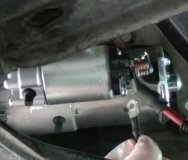Ok you say it causes shaking what shakes the exhaust or the whole car? If just the exhaust could be that something has broke loose inside the cat or you may have a hole in it. You would need to get under the car to find out more.
Causes of Catalytic Converter Failure
There are two ways a converter can fail:
It can become clogged.
It can become poisoned.
There really is no "inspection port" for the consumer or mechanic to see an actual clog in a converter. Often, the only way to tell if a catalytic converter is malfunctioning (plugged) is to remove it and check the change in engine performance. When a clogged converter is suspected, some mechanics temporarily remove the O2 sensor from the exhaust pipe ahead of the catalytic converter and look for a change in performance.
A catalytic converter relies on receiving the proper mix of exhaust gases at the proper temperature. Any additives or malfunctions that cause the mixture or the temperature of the exhaust gases to change reduce the effectiveness and life of the catalytic converter. Leaded gasoline and the over-use of certain fuel additives can shorten the life of a catalytic converter.
A catalytic converter can also fail because of:
Bad exhaust valves on the engine
Fouled plugs causing unburned fuel to overheat the converter
 Sometimes you can tell that a converter is clogged because you don't go any faster when you push the gas pedal. Also, there usually is a noticeable drop in gas mileage associated with a clogged catalytic converter. A partially clogged converter often acts like an engine governor, limiting the actual RPMs to a fast idle. A totally clogged converter causes the engine to quit after a few minutes because of all the increased exhaust back pressure.
.
SPONSORED LINKS
Monday, August 10th, 2009 AT 9:47 PM




